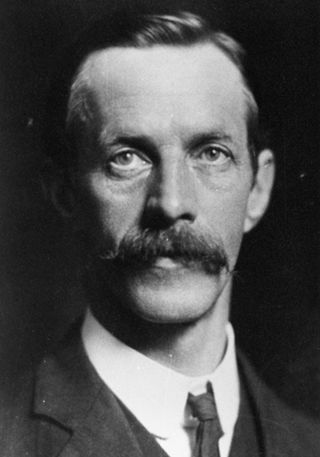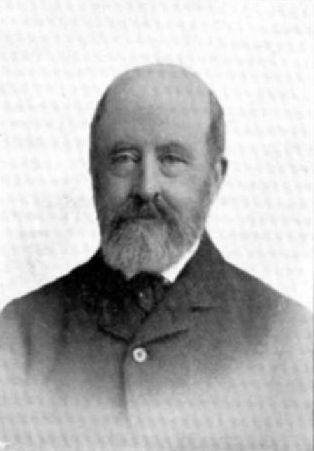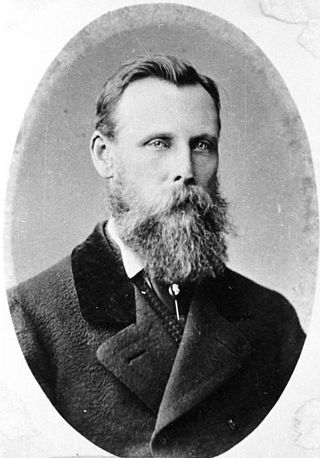| |||||||||||||
| |||||||||||||
| |||||||||||||
The Thames by-election of 1893 was a by-election held during the 11th New Zealand Parliament in the electorate of Thames.
| |||||||||||||
| |||||||||||||
| |||||||||||||
The Thames by-election of 1893 was a by-election held during the 11th New Zealand Parliament in the electorate of Thames.
The by-election was caused after the resignation of Liberal Party MP Alfred Cadman. The Liberals selected the incumbent Mayor of Thames, James McGowan as their candidate for Cadman's seat. After a large public gathering, it was decided not to run another candidate against McGowan in light of a general election being only months away, resulting in McGowan being elected unopposed. [1]

The 1893 New Zealand general election was held on 28 November and 20 December in the European and Māori electorates, respectively, to elect 74 MPs to the 12th session of the New Zealand Parliament. The election was won by the Liberal Party, and Richard Seddon became Prime Minister.

The 1899 New Zealand general election was held on 6 and 19 December in the European and Māori electorates, respectively, to elect 74 MPs to the 14th session of the New Zealand Parliament. The election was again won by the Liberal Party, and Richard Seddon remained Prime Minister.

The 1908 New Zealand general election was held on Tuesday, 17 and 24 November and 1 December in the general electorates, and on Wednesday, 2 December in the Māori electorates to elect a total of 80 MPs to the 17th session of the New Zealand Parliament. A total number of 537,003 (79.8%) voters turned out to vote.

Sir Alfred Jerome Cadman was a New Zealand politician of the Liberal Party. He was the Minister of Railways from 1895 to 1899 in the Liberal Government.

James McGowan was a New Zealand politician of the Liberal Party.

Richard Harman Jeffares Reeves was a New Zealand politician of the Liberal Party. He was acting Speaker of the Legislative Council in 1905.

Waikato is an electorate in the New Zealand Parliament. A Waikato electorate was first created in 1871 and an electorate by this name has existed from 1871 to 1963, 1969 to 1996, and 2008 to the present, though exact borders have often changed.
Bay of Islands is a former New Zealand parliamentary electorate. It existed during various periods between 1853 and 1993. It was thus one of the original 24 electoral districts, and New Zealand's first ever MP was elected, although unopposed, in the Bay of Islands; Hugh Carleton thus liked to be called the Father of the House.
Ohinemuri is a former New Zealand parliamentary electorate. It existed from 1896 to 1928, and was represented by five Members of Parliament.

William Shepherd Allen was an English Liberal politician. He also worked as a farmer and served as an MP in New Zealand.
Thames is a former New Zealand electorate, in the Thames-Coromandel District. It existed from 1871 to 1946.

Henry James Greenslade was a Liberal Party Member of Parliament in New Zealand.

Edmund Harvey Taylor was a Liberal Party Member of Parliament in New Zealand.
Te Aroha was a parliamentary electorate in the Waikato region of New Zealand from 1890 to 1893. The electorate was represented by two Members of Parliament. The current Te Aroha ward is represented by the Matamata-Piako District in the Waikato region of New Zealand.
Christchurch was a parliamentary electorate in Christchurch, New Zealand. It existed three times. Originally it was the Town of Christchurch from 1853 to 1860. From the 1860–1861 election to the 1871 election, it existed as City of Christchurch. It then existed from the 1875–1876 election until the 1881 election. The last period was from the 1890 election to the 1905 election. Since the 1946 election, a similarly named electorate called Christchurch Central has been in existence.
City of Dunedin, during the first two parliaments called Town of Dunedin, was a parliamentary electorate in Dunedin in Otago, New Zealand. It was one of the original electorates created in 1853 and existed, with two breaks, until 1905. The first break, from 1862 to 1866, was caused by an influx of people through the Otago Gold Rush, when many new electorates were formed in Otago. The second break occurred from 1881 to 1890. It was the only New Zealand electorate that was created as a single-member, two-member and three member electorate.

William Lee Rees was an English-born New Zealand cricketer, politician and lawyer.

The 1891 Te Aroha by-election was a by-election held on 9 July 1891 during the 11th New Zealand Parliament in the Waikato electorate of Te Aroha. The 1890 general election in the Te Aroha electorate had been contested by William Shepherd Allen and William Fraser. Allen was elected, but Fraser mounted a successful election petition, and Allen was disqualified from standing again. The by-election was contested by Fraser and Sir Walter Buller, the well known ornithologist, who both represented the Liberal Party, plus a third candidate who was not taken seriously. Shortly before the election, the Liberal Government made Fraser its official candidate. A candidate representing the opposition pulled out of the contest in late June, as it was clear that only a Liberal Party supporter could win. Fraser won the by-election, obtaining more than 60% of the votes.

The Thames by-election of 1909 was a by-election held during the 17th New Zealand Parliament.

The City of Auckland by-election of 1893 was a by-election held on 4 August 1893 during the 11th New Zealand Parliament in the urban upper North Island electorate of the City of Auckland.